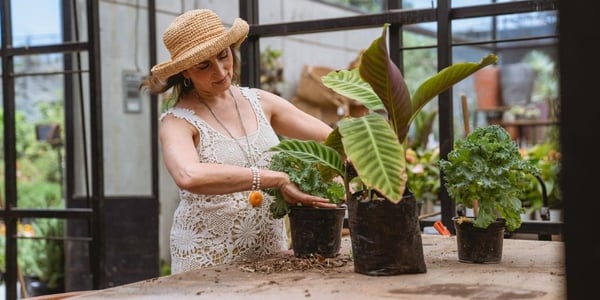Having indoor plants can bring numerous benefits, such as improving indoor air quality, reducing...


Having indoor plants can bring numerous benefits, such as improving indoor air quality, reducing...

When we think of air pollution, the images of smog-covered skylines and factory chimneys spewing...

Becoming an empty nester is a significant life transition that brings a mix of emotions and...

Beyond the confines of grocery stores and farmers' markets lies a vast wilderness brimming with...
The Magic of Houseplants: 9 Reasons To Keep Them in Your Home
Houseplants have become a staple in many homes, not just for their visual appeal but also for the various benefits they offer. They do more than just sit prettily on a windowsill. These plants can transform your living environment in several practical ways. In this blog, we’ll take a closer look at each of these benefits, providing you with valuable insights into how houseplants can contribute positively to your home and daily life.
A Practical Guide to Enhancing Your Home with Houseplants
Houseplants are more than just decorative items; they are important components of a healthy and inviting home environment.
1. They Look Great
Houseplants are an effortless way to add a touch of nature to any room. The variety is endless–from the tall and leafy Fiddle Leaf Fig to the small and resilient succulent. Consider the aesthetics of your space and choose plants that complement it. For instance, a Snake Plant or a ZZ Plant can add structure and elegance to modern decor, while flowering plants like African Violets add a splash of color to brighten a room.
But it's not just about looks. Plants can also enhance the feel of a room. A large Palm can make a room feel more open and airy, while small potted herbs on a kitchen windowsill can make the space feel more warm and inviting. Remember, it's not about spending a lot of money. Even a single well-placed plant can significantly affect a room's ambiance.
2. Plants Help Reduce Stress
Plants have a naturally calming effect, which can be particularly beneficial in today's fast-paced world. Studies have shown that having plants in your home or office can reduce stress and anxiety because they can create a more tranquil and restful environment, helping to lower blood pressure and improve overall emotional health.
For stress relief, consider plants like Lavender, known for its calming scent, or Rosemary, known to help improve memory function and relieve anxiety. Even the simple act of watering a plant can be a form of mindfulness, helping to redirect focus and reduce feelings of stress. If you're new to plants, start with something low-maintenance like a Spider Plant or a Pothos. As you become more comfortable with plant care, you can explore more varieties.
3. Plants Are Natural Air Purifiers
One of the most significant benefits of having houseplants is their ability to improve indoor air quality. Plants are nature's air purifiers, absorbing various pollutants and gases through their leaves and roots. A NASA study highlighted plants as natural air purifiers, and they found that certain houseplants can remove harmful toxins such as benzene, formaldehyde, and trichloroethylene from the air.
Plants like the Spider Plant and the Boston Fern are particularly effective. They not only absorb carbon dioxide and release oxygen, but they also eliminate significant amounts of VOCs. Additionally, plants like the Snake Plant are unique because they continue to release oxygen at night, making them ideal for bedrooms.
But how many plants do you need to purify a room? While there's no set number, a general guideline is to have at least one plant per 100 square feet of space. The larger and leafier the plant, the more effective it is at cleaning the air. Remember, though, that good air circulation is also important, so open windows when possible to allow fresh air to circulate.
4. Plants Help Improve Moods
Beyond the physical benefits, houseplants also play a significant role in improving mood and overall psychological well-being. Studies have shown that the presence of plants can reduce stress, anxiety, and depression. They create a more relaxing and positive atmosphere, which can be particularly beneficial in the current era where many people spend a lot of time indoors.
The simple act of caring for a plant, like watering or pruning, can be a therapeutic activity that takes your mind off daily stresses. It's not just about the physical presence of the plants but also about engaging with them. Plants like aloe vera and rubber plants are easy to care for and add a sense of achievement as you watch them grow and thrive.
Being around plants, especially in a work environment, can increase concentration, productivity, and creativity. They provide a much-needed break from screen time, with their natural textures and colors offering a soothing visual contrast to computers and phones.
5. Naturally Humidify Your Home
A lesser-known but significant benefit of houseplants is their ability to act as natural humidifiers. Through a process called transpiration, plants release moisture into the air, which can be especially helpful in dry climates or during winter when indoor heating can dry out the air.
Plants like the Areca Palm, Peace Lily, and Spider Plant are particularly good at this. They absorb water through their roots and then release it as vapor through pores in their leaves, increasing the room's humidity, which can help alleviate issues caused by dry air, such as dry skin, sore throats, and respiratory problems.
To maximize this benefit, group several plants together to create a 'microclimate' where humidity levels can be higher than the surrounding area. However, it's essential to strike a balance – too much humidity can lead to other issues like mold growth. Ensure good air circulation and monitor humidity levels to keep them comfortable.
6. Caring for Plants Provides a Sense of Responsibility
Caring for houseplants can provide a meaningful sense of responsibility. This aspect is particularly beneficial for individuals who live alone, work from home, or are looking for a low-stakes way to add routine and purpose to their day.
Plants require regular care – watering, feeding, pruning, and sometimes repotting. This routine can give structure to your day or week. It's not just about keeping the plant alive; it's about nurturing and watching it grow. Caring for your houseplants can be incredibly satisfying and provide a sense of achievement and purpose.
For those new to plants, start with hardy varieties like a ZZ Plant or Snake Plant. These plants are forgiving and can thrive with minimal care, making them ideal for beginners or busy individuals.
7. Great Natural Scent and Aroma
Houseplants can naturally enhance the scent of your indoor environment without the need for artificial fragrances. Using houseplants for their aroma is not only a more eco-friendly option but can also benefit those sensitive to synthetic smells. Plants like Jasmine, Gardenia, and Scented Geraniums release a natural fragrance that can fill a room with pleasant aromas. Herbs like Rosemary, Basil, and Lavender are aromatic and practical for culinary use. Integrating these plants into your home can create a multisensory experience, engaging both sight and smell and contributing to a more enjoyable and relaxing atmosphere.
8. Plants Help Absorb Sound
Incorporating plants into a room can subtly improve its acoustics by reducing noise levels, which is particularly useful in urban areas or for rooms with hard surfaces that tend to echo. Larger leafy plants like Fiddle Leaf Figs, Peace Lilies, and Rubber Plants are particularly effective at absorbing sound due to their broad leaves. Even smaller plants, when used in numbers, can contribute to a noticeable reduction in echo and noise, making plants an excellent addition to home offices, bedrooms, or any space where a quieter environment is desired.
9. Plants Offer Humane Pest Control
Certain houseplants can help control pests naturally, reducing the need for chemical insecticides. Plants such as Citronella, Marigolds, and Lavender are known for their ability to repel mosquitoes and other insects. Lemongrass contains citronella, which is a common ingredient in natural mosquito repellents. Similarly, the fragrance of Marigolds is known to deter aphids, mosquitoes, and even rabbits. Basil can repel flies and mosquitoes, while Lavender is effective against moths, fleas, and flies. By strategically placing these plants around your home, particularly in areas where pests are a concern, you can enjoy a more natural form of pest control.
Incorporating these expanded sections on the aromatic benefits, sound-absorbing qualities, and natural pest control capabilities of houseplants will provide your readers with practical and intriguing reasons to include more greenery in their living spaces.
Houseplants offer much more than a splash of green. Their subtle yet powerful impact ranges from freshening up your home with natural scents to dampening noise and keeping those pesky insects at bay. They're like quiet, hardworking companions, making your home a healthier, cozier, and more inviting place. So, if you haven't already, maybe it's time to bring a bit of the outdoors in.
Living50+